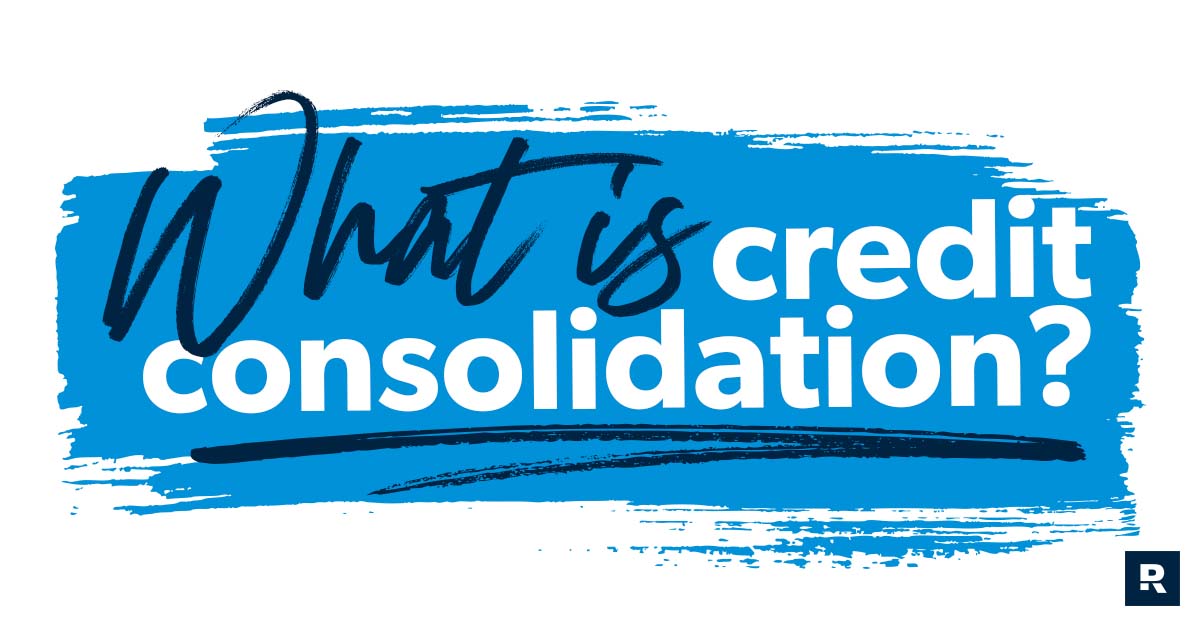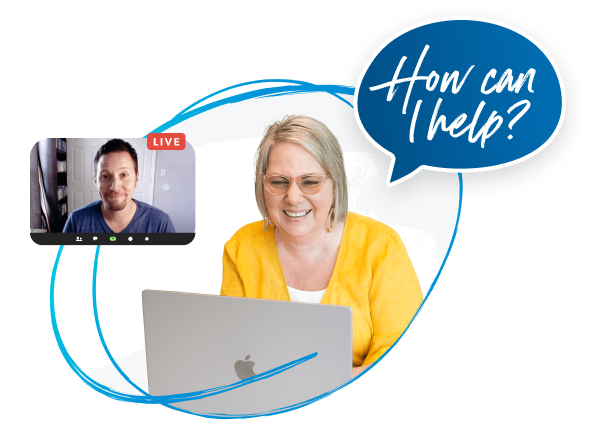Get this: 55 million households are swimming in the deep end of credit card debt.1,2 Many of those are probably looking at credit consolidation as a way out. But the problem is . . . the way out really isn’t the way out. It only leads you further into the deep end. Pretty depressing, right? Don’t worry—credit consolidation isn’t the lifeboat you’re looking for. There’s another way to get rid of that pile of debt, and it doesn’t include signing up for yet another loan. Stick with us, and we’ll show you how to dump debt and change your life for good. But first, let’s talk about what credit consolidation is and why it’s a bad idea.
What Is Credit Consolidation?
Credit consolidation is the process of taking multiple credit card payments (with sky-high interest rates) and rolling them into one single payment. The goal with consolidation is to exchange all those payments and high interest rates for a loan with one payment and a low interest rate. Sounds nice, doesn’t it? Well . . . there’s a catch: You don’t always get a lower rate. Sometimes, you get an even higher one. And that’s exactly why we at Ramsey like to call this credit CONsolidation.
Pay off debt fast and save more money with Financial Peace University.
At this point, you’re probably wondering, “What’s the point of consolidating if I’m not even going to get a better rate?” Spoiler: There isn’t one. But if you’re still kicking the tires on the idea of how credit consolidation might help you, keep on reading.
What’s the difference between credit consolidation and debt consolidation?
In your search for help, you may have come across something called debt consolidation. So, what’s the difference? Truth is, there isn’t one. Credit consolidation is just debt consolidation with a different name. But don’t be fooled. No matter what you call it, it’s still a bad idea.
How Does Credit Consolidation Work?
When debt payments are eating up your income, you’ll do anything to keep more of your hard-earned money where it belongs—in your wallet. Here’s how credit consolidation is supposed to do that:
Let’s say you’ve got three credit cards. You owe $850 to Discover at an interest rate of 21%, $3,500 to MasterCard at 17%, and $5,440 to Visa at 19%. (Insert long, low whistle here.) To say you’re struggling to make the minimum payments on all these cards month after month—on top of your other bills—is an understatement.
So, you hit up a lender to talk about credit consolidation. This lender will offer to “make things easier” on you by lumping those credit card payments into one through another loan or another credit card. (Ahem—that means more debt.)
But you’ve got to prove you’re a good candidate. The lender will check out your debt-to-income ratio, your credit score, mortgage info, insurance and more. If they decide you’re worthy, they’ll offer you a loan.
Depending on what kind of lender and what kind of loan you got, the lender may pay your old debts for you with the money you’re borrowing. Or the lender will just cut you a check or send you a new credit card so you can pay off the old debt yourself. Either way, you’re still in debt and have to make monthly payments to the new lender. See how this isn’t really solving your debt problem?
Is Credit Consolidation a Bad Idea?
Absolutely. If your credit card debt’s got you in over your head, the worst thing you could do is get another loan—even if that loan promises to be the answer to your problems. (It’s not.) Remember: You can’t borrow your way out of debt.
With credit consolidation, you’re trying to fix your credit card debt with a lower interest rate. But the interest rate really isn’t the problem. The problem is that you’re spending everything you make instead of paying off your debt.
Personal finance is 80% behavior and only 20% head knowledge. So that means, no matter what solution you come up with to take care of the debt, it’s not going to stick unless you decide to start with the person in the mirror.
The truth is, there’s no “silver bullet” that will painlessly solve your debt problem. You have to take control of your spending and decide enough is enough. You’re not going to live with debt anymore!
To help you avoid any other distractions, we’ll go ahead and tell you that credit and debt consolidation loans come in many different forms (with many names), and every single one of them is a bad idea.
Here’s what you need to watch out for:
Debt settlement: This one is a doozy. In the case of debt settlement, you’ll pay a company to “settle” your debts for you. But often, they’ll tell you to stop paying your debts while they collect your money and negotiate a lower rate or lower balance. All that does is put you further in the hole. Yikes.
Credit card balance transfer: Balance transfer credit cards allow you to transfer your debt to a card with a zero interest rate (plus a fee). But that zero rate is only a promotion. Once it ends, you’ve got to start paying up—at a variable interest rate too. Do yourself a favor and avoid this one.
Debt management plan (DMP): Instead of walking through a DMP with a credit counselor, why not create your own (without the fees) with a financial coach? You can and will get out of debt—and you don’t need a DMP to do it!
Home equity line of credit (HELOC): Don’t even think about it. Borrowing money from the equity in your home is a really, really bad idea. There are better ways to keep your head above water without putting your Four Walls at risk.
401(k) loan: Just like Taylor Swift is never ever getting back together with her ex, you should never ever take a loan from your 401(k). Sure, you might think, “I’ll pay myself back.” But think of it this way: You’re stealing from your future. Plus, you’ll get slammed with interest and crazy fees on top of what you take out. It’s just not worth it.
Take Control of Your Money
At this point, you’re probably wondering how in the world you’ll ever get your head above water. Don’t worry. You will. How do we know? Because you’re looking for a way out and you’re finally ready to change how you handle your money.
This is the moment you have to decide if you want to take the “easy” way out (that will just lead you further into debt) or choose to take the road that leads to real freedom from debt. Here’s the thing: The road to freedom is never easy. But it’s so worth it. So, get your game face on, pull up your bootstraps, and let’s get to work. Follow these steps, and you’ll be kicking your debt to the curb in no time:
1. Make a budget (and stick to it).
This is the most important thing you’ll do this month. Just like brushing your teeth should be the first thing you do every day, a budget should be the first thing you do every month (before the month even begins). Creating a zero-based budget means that your income minus your expenses should equal zero. Don’t worry, we have an app for that. It’s called EveryDollar, and it’s free. Download it here and create your first budget today.
And get this: The average household finds $332 in their first month budgeting with EveryDollar. Score!
2. Use the debt snowball method to get rid of your debt forever.
Credit consolidation has nothing on the debt snowball. It’s true—this is the best way to get out of debt for good. Here’s how it works:
- List your debts from smallest to largest regardless of interest rate.
- Make the minimum payment on everything but the little one.
- Attack the smallest debt with a vengeance. Once that debt is gone, take that payment and put it toward the next-smallest debt. The more you pay off, the more your freed-up money grows and gets thrown on the next debt (like a snowball rolling downhill).
- Repeat until you’re completely debt-free.
Want to know why the debt snowball method is so powerful? Once you pay off that smallest debt and see that snowball grow, you won’t want to stop. It’s the small wins that will keep you rolling that snowball until you’re completely free. And that’s a great feeling.
3. Talk to a financial coach and get a customized money plan.
Have you ever had someone really believe in you? Someone who walked alongside you in a tough time and cheered you on to victory? If not, it’s time to talk to a financial coach and invite them to join your team.
They’ll help you create a plan to get from where you are to where you want to be—winning with money. And then they’ll cheer you on every single step of the way (and help you course-correct if you get off track).
Don't Go It Alone: Connect With a Financial Coach
A trained financial coach helps you navigate your money problems and make real money progress.
4. Use Financial Peace University to pay off debt faster.
Living paycheck to paycheck is for the birds. There’s a better way to handle your money and live the life you really want—without going into even more debt. It’s time to learn how to handle your money the right way with Financial Peace University.
Jump in and check out the first two lessons. You’ll learn how to save for emergencies, how to do a budget, and how to start attacking your debt with everything you’ve got.
Take the first step toward a life free of debt and full of possibilities.




